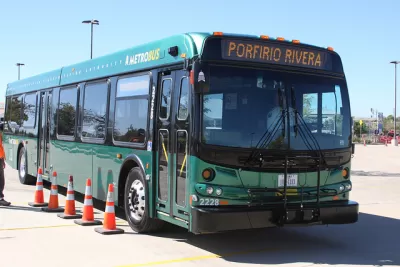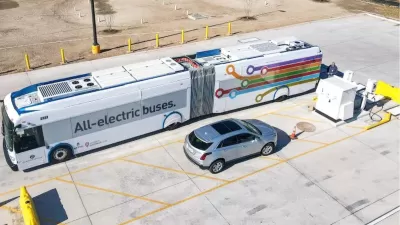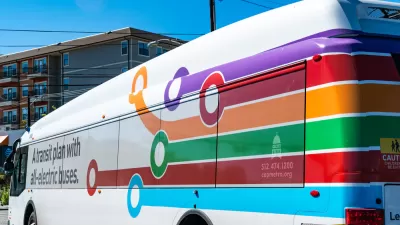Austin's transit agency is accelerating its move toward an all-electric fleet with the addition of 200 new electric buses.

The board of Austin's Capital Metro has "approved the purchase of almost 200 battery-powered buses" and announced the groundbreaking of " two new high-frequency bus lines in the coming months," as reported by Nathan Bernier. "The board voted unanimously Monday to spend $255 million on 197 electric buses from two different companies, paving the way for the transit authority's gradual transition to an all-electric fleet." Adding to the twelve electric buses already operating on Austin's streets, the new purchase will bring the agency closer to its goal of replacing all of its more than 350 buses with battery-powered vehicles by 2035.
"Capital Metro is conducting an analysis to compare the lifetime costs of electric buses to diesel buses," but, according to Capital Metro's Director of Vehicle Maintenance Andrew Murphy, "in the end, the electric buses should cost less" due to lower fuel and maintenance costs. "From a rider's perspective, electric buses are quieter, emit less heat and don't blast diesel exhaust in your face at the bus stop. They also provide smoother rides. They have a lower center of gravity and single-gear transmission, so the buses don't jerk as much as diesel buses when the driver shifts gears to accelerate."
Meanwhile, the $44.6 million Expo Center MetroRapid Line, which will run from the Travis County Expo Center to UT Austin and downtown, will begin construction in December. In January, Metro plans to begin construction on the Pleasant Valley Line, "connecting the Mueller development to the Goodnight Ranch neighborhood on Slaughter Lane." The new lines are slated to begin service in mid-2023.
"Bus shelters along the Expo and Pleasant Valley lines are expected to have electronic screens showing when the next buses arrive, along with other information. Cap Metro says each stop will have ticket vending machines and the potential for things like public art and trees."
The projects are funded through the "$7.1 billion Project Connect proposal authorized by voters in November in exchange for a property tax rate increase of 8.75 cents per $100 of property value."
FULL STORY: Capital Metro Accelerates Move To All-Electric Fleet, Gives Glimpse Of Expanded High-Frequency Bus Service

Maui's Vacation Rental Debate Turns Ugly
Verbal attacks, misinformation campaigns and fistfights plague a high-stakes debate to convert thousands of vacation rentals into long-term housing.

Planetizen Federal Action Tracker
A weekly monitor of how Trump’s orders and actions are impacting planners and planning in America.

In Urban Planning, AI Prompting Could be the New Design Thinking
Creativity has long been key to great urban design. What if we see AI as our new creative partner?

King County Supportive Housing Program Offers Hope for Unhoused Residents
The county is taking a ‘Housing First’ approach that prioritizes getting people into housing, then offering wraparound supportive services.

Researchers Use AI to Get Clearer Picture of US Housing
Analysts are using artificial intelligence to supercharge their research by allowing them to comb through data faster. Though these AI tools can be error prone, they save time and housing researchers are optimistic about the future.

Making Shared Micromobility More Inclusive
Cities and shared mobility system operators can do more to include people with disabilities in planning and operations, per a new report.
Urban Design for Planners 1: Software Tools
This six-course series explores essential urban design concepts using open source software and equips planners with the tools they need to participate fully in the urban design process.
Planning for Universal Design
Learn the tools for implementing Universal Design in planning regulations.
planning NEXT
Appalachian Highlands Housing Partners
Mpact (founded as Rail~Volution)
City of Camden Redevelopment Agency
City of Astoria
City of Portland
City of Laramie




























